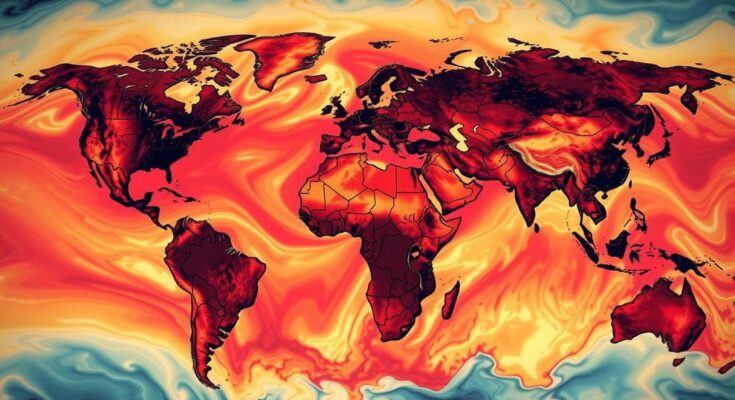In 2024, human-caused climate change led to an average increase of 41 days of dangerous heat globally, significantly affecting weather patterns and contributing to numerous extreme weather events. It was found that climate change played a major role in the severity of heatwaves, droughts, and destructive storms, with poorer nations facing the worst consequences. These findings underscore the urgent need for climate action to mitigate impacts and prepare for future changes.
In 2024, climate change resulted in an alarming average increase of 41 days of dangerously high temperatures worldwide, as reported by scientists from World Weather Attribution and Climate Central. This year saw unprecedented global heat, contributing to the likelihood that 2024 will be the hottest year on record, exacerbating severe weather events across various regions. Researchers concluded that human-induced climate change significantly intensified extreme weather phenomena, including heatwaves, droughts, and heavy rainfall, leading to loss of life and devastation across the globe.
Prominent climate scientists, such as Friederike Otto from Imperial College, indicated that climate change was a major contributing factor in almost all extreme weather events examined, jeopardizing the lives and livelihoods of millions. Increasing temperatures in regions such as Northern California, Death Valley, and southern Europe exemplified the heat’s pervasive and detrimental effects, prompting school closures and health risks, particularly for vulnerable populations in West Africa.
The methodology employed in the analysis involved comparing daily temperature records from 2024 to theoretical expectations of a non-climate-affected world. Although the study has not yet undergone peer review, it follows established scientific protocols. Researchers noted that some areas experienced over 150 days of extreme heat, with impoverished nations bearing the brunt of these occurrences.
Moreover, the impact of extreme heat on mortality rates remains grossly underestimated, as heatwaves are reported to be the deadliest form of extreme weather attributable to climate change. Scientists warn that the planet is approaching the critical 1.5 degrees Celsius threshold set by the Paris Agreement, underscoring the urgent need for immediate action to mitigate climate impacts. The analysis examined 29 extreme weather events, establishing climate change links in 26 cases, further accentuating the necessity for global climate action.
Although certain climatic phenomena, such as El Niño, contributed to exacerbating adverse weather conditions, researchers emphasized that climate change remains the dominant factor influencing the severity of such events. Experts assert that unless global greenhouse gas emissions are significantly reduced, extreme weather patterns, including more intense storms and unprecedented rainfall, will continue to escalate. Nevertheless, proactive measures can potentially lessen the adverse effects of climate change through preparedness and adaptability initiatives across nations.
These stark findings reinforce the message that comprehensive climate action is imperative as the world faces an increasingly hostile climate landscape.
The increasing frequency and severity of heatwaves and extreme weather events in recent years can largely be attributed to human-induced climate change. The analysis conducted for 2024 serves as a crucial indicator of how rising global temperatures are affecting weather patterns and public health. The urgency of mitigating greenhouse gas emissions to avert catastrophic climate scenarios remains a focal point for scientists, policymakers, and environmental organizations worldwide, especially as global temperatures are edging closer to critical thresholds established in international climate agreements such as the Paris Agreement. This year’s extreme weather episodes further illustrate the interconnectedness of climate phenomena and the immediate need for adaptive strategies to protect vulnerable populations.
In summary, the report highlights a troubling trend in climate change as evidenced by the unprecedented 41 additional days of dangerous heat recorded in 2024. This phenomenon has disastrous consequences for both human life and environmental stability, with vulnerable regions experiencing the most significant impacts. Urgent climate action is essential to mitigate these effects and prevent further escalation of extreme weather events, thereby safeguarding ecosystems and human systems alike. The call for global cooperation and effective adaptation strategies is paramount in addressing this pressing crisis.
Original Source: abcnews.go.com




